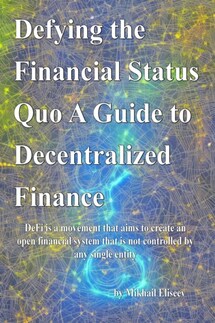A Beginner's Guide to Digital Currencies and the Blockchain - страница 4
Choose a digital currency exchange: If you want to buy or sell digital currencies, you will need to use a digital currency exchange. There are many different exchanges to choose from, so make sure to do your research and select one that meets your needs.
Secure your digital currency holdings: It's important to protect your digital currency holdings from potential security risks. Make sure to choose a secure digital wallet and be cautious when it comes to protecting your private keys.
Start small: Don't invest more than you can afford to lose. It's generally a good idea to start small and gradually increase your investments as you become more comfortable with the space.
Stay up-to-date: Digital currencies and the blockchain technology that underlies them are rapidly evolving. Make sure to stay up-to-date on the latest developments and be open to the possibility of new and innovative uses for this technology.
We hope that these tips will help you get started with digital currencies and the blockchain. Remember, it's important to do your research and understand the risks before making any financial decisions. Good luck on your digital currency journey!
Chapter 14: Common Questions About Digital Currencies
Here are some common questions about digital currencies and their answers:
What is a digital currency?
A digital currency is a form of digital or virtual money that is not backed by any physical asset or government. Digital currencies use decentralized, distributed ledger technology (such as the blockchain) to record transactions and ensure the security and immutability of those transactions.
How do digital currencies work?
Digital currencies work by using decentralized, distributed ledger technology (such as the blockchain) to record transactions and verify the authenticity of those transactions. Transactions are recorded on multiple computers, rather than being managed by a central authority. This ensures that the transaction history is accurate and transparent, and that transactions cannot be altered.
What are some examples of digital currencies?
Some examples of digital currencies include Bitcoin, Ethereum, Litecoin, and Monero.
How do I buy or sell digital currencies?
To buy or sell digital currencies, you will need to use a digital currency exchange. A digital currency exchange is a platform that allows you to buy and sell digital currencies using traditional fiat currencies or other digital currencies.
How do I store my digital currency holdings?
To store your digital currency holdings, you will need to use a digital wallet. A digital wallet is a software program that allows you to store, send, and receive digital currencies. There are several types of digital wallets to choose from, including hot wallets, cold wallets, desktop wallets, mobile wallets, and hardware wallets.
Are digital currencies safe?
Digital currencies are generally secure, thanks to the use of cryptography and the decentralized nature of the blockchain. However, there are some security risks to be aware of, such as the risk of exchanges being hacked or digital currency holders losing access to their funds. It's important to choose a secure digital wallet and be cautious when it comes to protecting your private keys.
Are digital currencies regulated?
The regulation of digital currencies varies from country to country. Some countries, such as the United States and the European Union, have put in place regulations to prevent money laundering and other illegal activities using digital currencies. However, digital currencies are not regulated in the same way as traditional fiat currencies.







